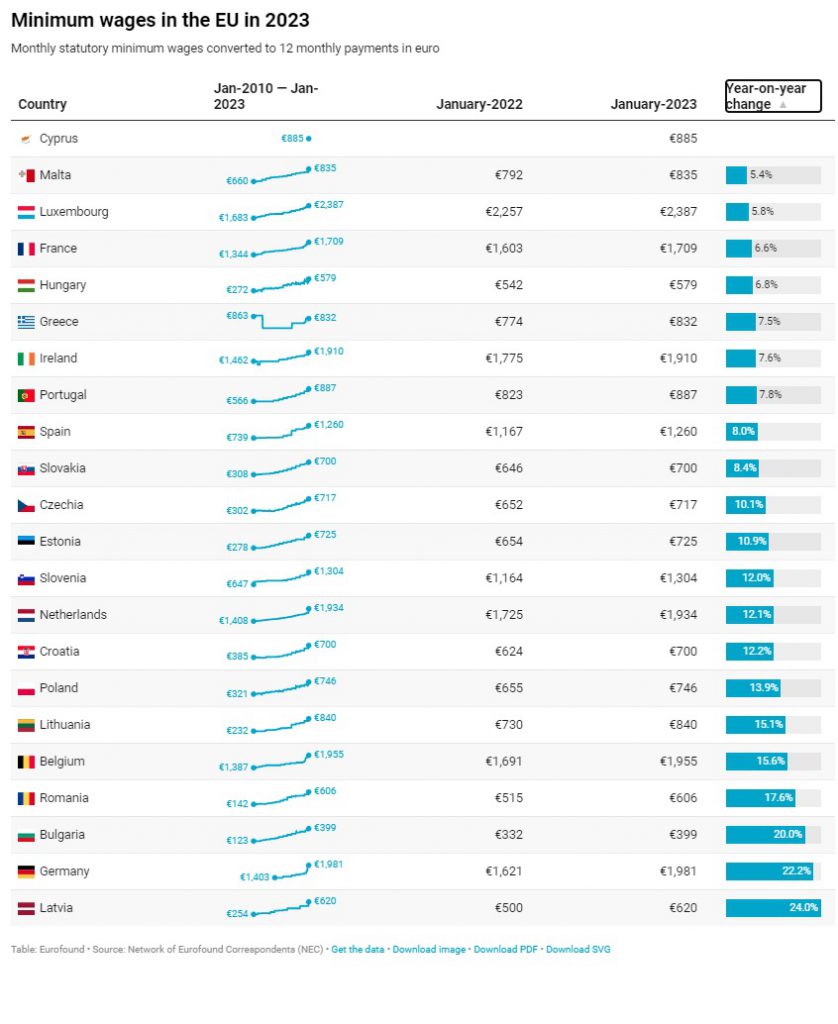Malta with the lowest minimum wage increase in the EU

Despite the €9.90 weekly rise, minimum wage earners in Malta had the lowest increase across the EU in 2023 with a modest 5.4% rise in their salary which reached €835. Moreover, the rise has already eaten up by the cost of living increase (HICP) which was of 7.29%.
This data was published by Eurofound in its annual analysis of minimum wage trends across the EU whereby increases reached an all-time high. However, as in the case of Malta, in many other countries the workers’ purchasing power was eroded nonetheless due to the exceptionally high rate of inflation. Looking ahead, Eurofound is forecasting inflation rates to remain high, meaning that minimum wages are expected to be eroded further by the end of this year.

In 2023 nominal increases (without taking into consideration inflation) in minimum wages across the EU rose by huge margins in countries like Latvia (24%), Germany (22.2%) and Bulgaria (20%) down to as little as 5.4% in Malta and 5.8% in Luxembourg. In Cyprus there was no increase for the simple reason that the statutory minimum wage of €885 has just been introduced. On average, the minimum wage increased by 12% across the EU which is twice as much as in 2022.
Inflation eating up the increase
Despite the record increases, in most cases this was not enough to offset the rise in the cost of living. The only countries where the minimum wage increase in real terms was above 1% were Latvia, Germany, Romania, Belgium and Slovenia. On the other hand in Czechia for example inflation (16.78%) was almost three times as much as the minimum wage increase (9.79%). Other notable discrepancies were registered in Hungary, Lithuania, Estonia, Slovakia, Portugal and Malta.

How did other countries address the exceptional rise in inflation?
- In Malta inflation is catered for by the cost of living allowance mechanism (COLA) which in 2023 translated to a weekly rise of €9.90. However, the unique circumstances prompted the government to introduce a further mechanism to support vulnerable low-income households to mitigate the situation. However, not all minimum wage earners necessarily qualify for this new measure.
- Three Member States – Belgium, France and Luxembourg – have automatic indexation mechanisms to ensure that statutory minimum wages are updated in line with inflation. Belgium had a series of six increases after January 2022, five of them due to indexation, as the ‘smoothed health index’ increased by more than 2% several times during the year. The latest increases were made in November and December, and no further increase was applied in January.
- In France, two additional increases were made based on the regular indexation formula in 2022.
- Luxembourg applied one additional increase as a result of the automatic indexation but postponed a second increase by 12 months, based on tripartite agreement, arguing that this would ensure predictability for companies. For January 2023, the statutory minimum wage was nevertheless uprated in line with actual wage development, adhering to the regular biannual practice.
Even if rising inflation slows in 2023, it is likely to remain well above the price stability target of 2% per annum, and a further depreciation in the purchasing power of wages can be expected, except where they are increased within the year.
See the Eurofound report here.
